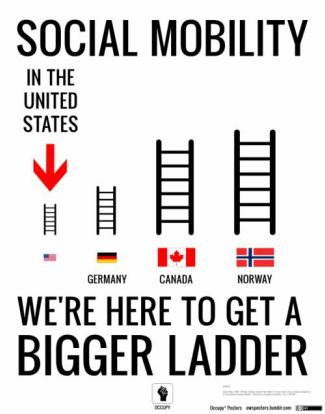 Tags: capitalism, class, economic sociology, education, inequality, intergenerational mobility, intragenerational mobility, occupy wall street, ows, social mobility, subtitles/CC, 00 to 05 mins Year: 2011 Length: 3:09 Access: YouTube Summary: In this short news clip, journalist Fareed Zakaria discusses what he believes to be Occupy Wall Street's core criticism. Noting that the United States has long had greater levels of inequality than many other nations, he argues that inequality can't be the sole catalyst for the protests. Instead, he thinks the movement was born from the sinking realization that it is increasingly difficult to move up the social mobility ladder and that Americans generally put up with inequality because they believe they can change their own class status. Zakaria points to a Time magazine article written by Rana Foroohar, which explores empirical evidence about social mobility in the United States. In terms of intragenerational mobility, Foroohar notes that if you were born in 1970 in the bottom 20% of our socioeconomic spectrum, you have a 17% chance of making it into the upper 40% of the spectrum. Turning to intergenerational mobility, nearly half of men whose fathers were in the bottom 20% of the socioeconomic spectrum, remained in the bottom 20%. In comparison to Denmark and Sweden, only a quarter of men remained in the bottom 20% of the spectrum, leading to the uncomfortable conclusion that the American dream is really only alive and well in Europe. The antidote to this crisis, as Zakaria argues, is improved education, and he tackles the argument in greater detail in a special he hosts called Fixing Education. The clip works nicely as an introduction to the topic of social mobility, but also as a vivid example of how empirical observation can powerfully expose the myths, which buttress American exceptionalism and ultimately perpetuate American inequality. It also dovetails nicely with Nobel prize winning economist, Joseph Stiglitz's new book, The Price of Inequality: How Today's Society Endangers Our Future, where he argues that the Horatio Alger rags-to riches story is no longer a reality for Americans. Submitted By: Lester Andrist
3 Comments
todd frank
7/20/2022 12:01:39 am
thought the physicians said there is no pills or another way for PENIS ENLARGEMENT !!! I am telling you today that Dr Moses Buba has the product for PENIS ENLARGEMENT and it worked perfectly for me from 3:0 to 8:95 and still counting. Contact Dr Moses Buba for help to Enlarge your penis via Email Address: [email protected] and alo reach him on WhatsApp with mobile number: +2349060529305 Be your brothers keeper by sharing this vital information to other fellow men around the global world connection
Reply
Manuel Franco
7/30/2023 12:11:39 pm
I just want to say Thank You to everyone who supported me through the years. My name is Manuel Franco, New Berlin, Wisconsin. My story of how I won the Powerball lottery of $768.4M is a bit of a tale. I have been playing Powerball tickets for 6 years now since I turned 18. I bought my first ticket on my 18 birthday. I was feeling very lucky that day because I had contacted Dr. Odunga Michael to help me with the winning Powerball numbers. I really had that great great feeling that I looked at the camera wanting to wink at it. I only did a tiny part of it and trusted him. He gave me the numbers after I played a couple other tickets along with it for $10. I checked my ticket after the winnings came online and saw the numbers were correct including the Power play. I screamed for about 10 minutes because it felt like a dream. I had won $768.4M. You can check my winning testimony with the lottery officials just with my name search. Thank you Dr Odunga. Well, his email is [email protected] and you can also call or Whats-app him at +2348167159012 so you guys can contact him
Reply
mark hold
7/8/2024 08:21:47 am
Herbal Penis Enlargement product is 100% guaranteed to Enlarge and get a better ERECTION, the reason why most people are finding it difficult to enlarge Penis is that they believe in medical reports, drugs and medical treatment which is not helpful for Penis Enlargement. Natural roots/herbs are the best remedies which can easily Enlarge your Penis permanently Contact Dr MOSES BUBA via Email: [email protected] or via WhatsApp: +2349060529305. for Natural root and herbal remedies put together to help Enlarge manhood and Erect healthily. I also learn that Dr MOSES BUBA also can cure other types of diseases, HEPATITIS B,DIABETICS,CANCER,HPV,LOW SPERM CAM, HIV/STDS, FIBROSIS LOST OF WEIGHT, BREAST ENLARGEMENT, HIPS and BUMS ENLARGEMENT etc .
Reply
Leave a Reply. |
Tags
All
.
Got any videos?
Are you finding useful videos for your classes? Do you have good videos you use in your own classes? Please consider submitting your videos here and helping us build our database!
|
 RSS Feed
RSS Feed
